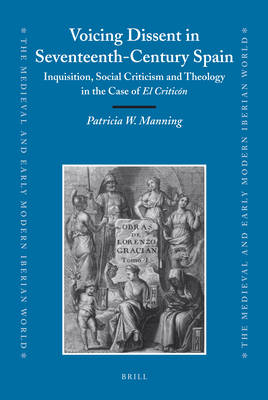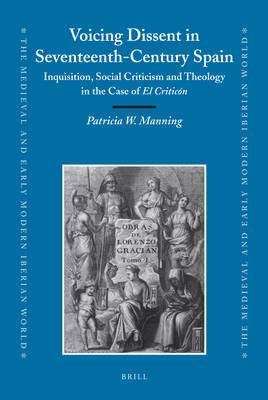
- Afhalen na 1 uur in een winkel met voorraad
- Gratis thuislevering in België vanaf € 30
- Ruim aanbod met 7 miljoen producten
- Afhalen na 1 uur in een winkel met voorraad
- Gratis thuislevering in België vanaf € 30
- Ruim aanbod met 7 miljoen producten
Zoeken
Voicing Dissent in Seventeenth-Century Spain
Inquisition, Social Criticism and Theology in the Case of El Criticón
Patricia Manning
€ 337,45
+ 674 punten
Omschrijving
Although the Spanish Inquisition looms large in many conceptions of the early modern Hispanic world, relatively few studies have been made of the Spanish state and Inquisition's approach to book censorship in the seventeenth century. Merging archival and rare book research with a case study of the fiction of Baltasar Gracián, this book argues that privileged authors, like the Jesuit Gracián, circumvented publication strictures that were meant to ensure that printed materials conformed to the standards of Catholicism and supported the goals of the absolute monarchy. In contrast to some elite authors who composed readily transparent critiques of authorities and encountered difficulties with the state and Inquisition, others, like Gracián, made their criticisms covertly in complicated texts like El Criticón.
Specificaties
Betrokkenen
- Auteur(s):
- Uitgeverij:
Inhoud
- Aantal bladzijden:
- 340
- Taal:
- Engels
- Reeks:
- Reeksnummer:
- nr. 37
Eigenschappen
- Productcode (EAN):
- 9789004178519
- Verschijningsdatum:
- 29/09/2009
- Uitvoering:
- Hardcover
- Formaat:
- Ongenaaid / garenloos gebonden
- Afmetingen:
- 157 mm x 239 mm
- Gewicht:
- 635 g

Alleen bij Standaard Boekhandel
+ 674 punten op je klantenkaart van Standaard Boekhandel
Beoordelingen
We publiceren alleen reviews die voldoen aan de voorwaarden voor reviews. Bekijk onze voorwaarden voor reviews.








